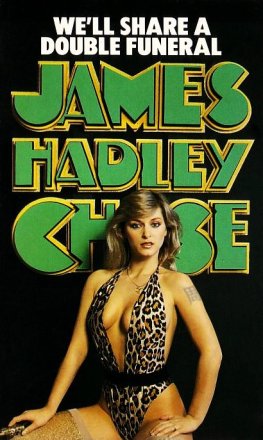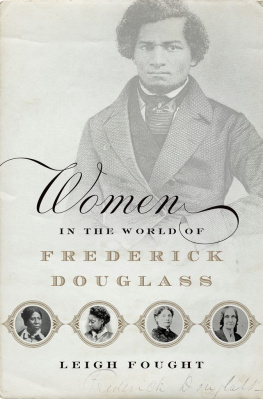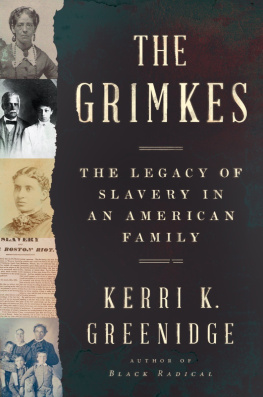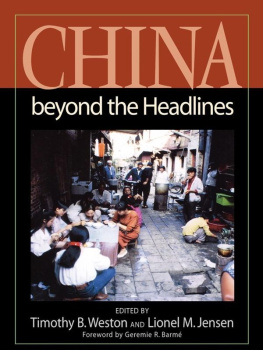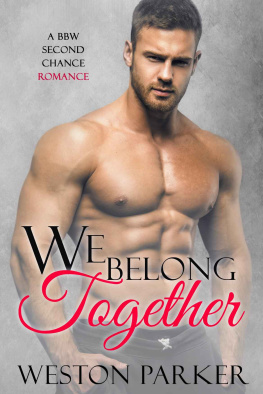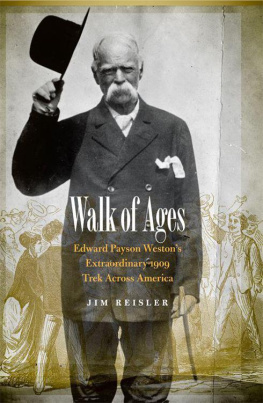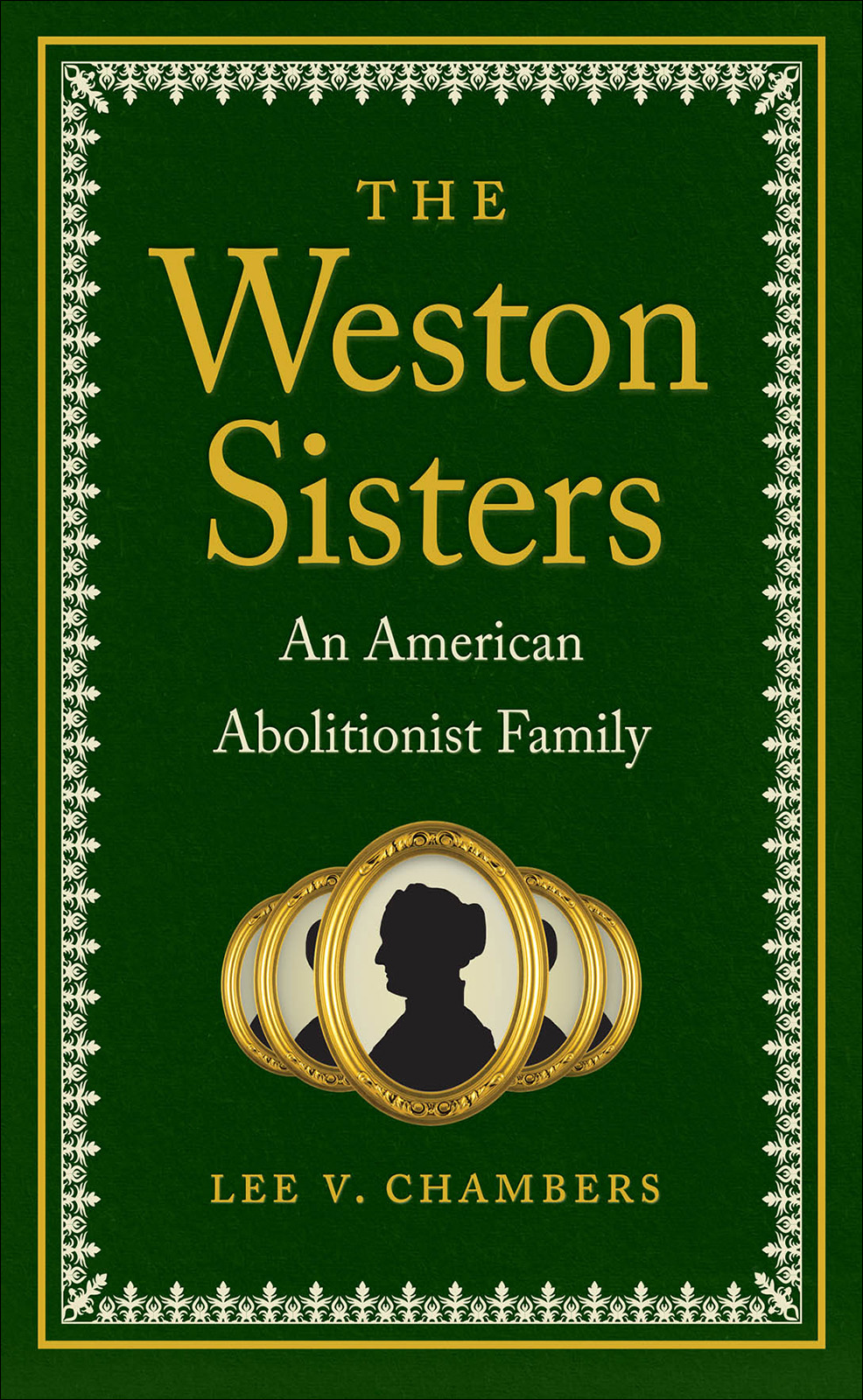
Contents
The Weston Sisters
This book was published with the assistance of the Thornton H. Brooks Fund of the University of North Carolina Press.
2014 The University of North Carolina Press
All rights reserved
Manufactured in the United States of America
Set in Miller types by codeMantra
The paper in this book meets the guidelines for permanence and durability of the Committee on Production Guidelines for Book Longevity of the Council on Library Resources. The University of North Carolina Press has been a member of the Green Press Initiative since 2003.
Complete cataloging information for this title is available from the Library of Congress
978-1-4696-1817-3 (pbk.: alk. paper)
978-1-4696-1818-0 (ebook)
For my siblings,
William Bell Chambers,
Leslie Chambers Trujillo, and Kenneth Carter Chambers,
and my son,
Devon Leith Schiller
Contents
1 / Married to the Cause
The Weston Sisters and Antislavery
2 / Married to Each Other
Marriage, Singlehood, and Sororal Practice
3 / I Must Make Money
The Sororal Economy
4 / The Cross of My Life
Social Reproduction in the Sororal Household
5 / As If I Had Never Been Absent
The Household Extends Its Reach
6 / Yours with the United Faculties of Martha and Mary
Politics and Kin-Keeping
7 / Rocking the Nation Like a Cradle
The Political Import of Households
8 / Impudent Puppies
Sisters in the Household of Faith
APPENDIX / To Be Left at Capt Westons Near Wales Tavern
On Correspondence
The Weston Sisters
Introduction: A Household Band
On a winters eve in 1840, Caroline Weston of Weymouth, Massachusetts, ruminated on the traumatic schism that had divided American abolitionists and ended the collective social activism of Bostons antislavery women. While there had been differences of opinion over ideology and tactics, the sisters Weston believed that the conflict that tore asunder the Boston Female Anti-Slavery Society (BFAS) had to do with gender: gender ideals and roles, the civil rights and moral obligations of women, and the appropriate relations of the sisters to the brethren.
While the new Massachusetts Abolition Society opposed the introduction into our cause of what is technically called the Womans Rights question and the appointment of women to the associations business committee, Caroline Westons charismatic elder sister, Maria Weston Chapman, argued vigorously that for the slaves sake we [antislavery women] are bound to urge on all his advocates the use of all their powers according to their own consciences.
Caroline was not alone in holding this view. In 1855, Oliver Johnson, a founding member of the New England Anti-Slavery Society and its agent for many years,
In speaking of this family, both Maria and Caroline meant themselves and their younger sistersAnne, Debora, Lucia, and Emma Weston, abolitionists all. A family of marked genius, according to Lucias close friend Sarah Southwick, the Weston daughters were very unlike, but all talented.
Two years younger than Maria, Caroline was said to be a delightful woman, not so handsome or majestic looking as [Maria], but with perhaps more sweetness of manner and a good deal of the same energetic frame of mind. Among family, friends, and colleagues Caroline was known as one who attempted impossibilities, continuously giving her life and labor for others. Abolitionist Edmund Quincy, with whom she exchanged daily correspondence, called her a sincere warm-hearted friend who would stand by us to the death and do any possible service to us or ours. William Lloyd Garrison, founder and editor of the antislavery newspaper the Liberator, described her as one of the rare women of the world for moral heroism and intellectual acumen and a most effective laborer in the cause. Despite the nickname Duchess of Sutherland, attached after her sojourn abroad in the late 1840s and early 1850s, Caroline demonstrated a less imperious manner and more pragmatic mind than Maria. She spoke bluntly but with less acerbity than her older sister. She had a ready and subtle sense of humorfewer puns than Maria and less saucy than Anne. Temperamentally, Caroline had more in common with her younger sister Debora, although she proved less tolerant of incompetence and less patient with foolishness. Goal oriented, Caroline was no ones pushover. She commanded her troops, familial and associational, with a manner both firm and generous.
Anne Warren Weston saw herself as molded in a less heroic strain than her elder sisters, a descendent of John Bunyans Much Afraid. Philadelphia Quaker and abolitionist Sarah Pugh acknowledged, Ann[e] is weak in contrast to Caroline, who was strong and able to do for herself and others. Yet if prone to hypochondria, Anne was also popular. Quincy described her as the best conversationalist, male or female, whom he had ever met: charming, fresh, and original. According to abolitionist lecturer Sallie Holley,
Debora, nicknamed Dora or Bella by the family, was famous for having a great deal... to do at once. Viewed as the familys indispensable housekeeper and care-taker, Debora served as favorite teacher, devoted nurse, beloved aunt, and neighborhood benefactor. She attended to all the thousand little duties of a country neighborhood.... Visits, parties, hikes, road mending, sewing meetings, Freedmans Aid Societies, all are in her hands and keep her very busy. Although she was known as a very bright, animated, cheerful girl, it was Deboras capability that struck even relative strangers, for she was very efficient & smart. Debora declined any formal position officiating over female antislavery societies, although she played a crucial role in getting New Bedfords onto solid ground. Despite her antipathy for the spotlight, Debora worked as hard as her sisters to manage their business, whether passing petitions, making and selling fair goods, or working behind the scenes to uphold the weary, strengthen the dispirited, and calm the provoked.
By all accounts the sweetest Weston was Lucia, openly affectionate with family and cordial and confiding to others. She had an easy quietness of disposition, a patient, self-effacing, staunch, and good-spirited manner that made her both an excellent nurse and a charming invalid. Indeed, she made of her consumption, which lasted almost twenty years, a social affair.
Strangers as well as friends saw in Emma Forbes Weston the beauty of the family. A bright vision, she was described in terms of light: very striking with her blonde complexion and abundance of flaxen hair. Distingu and flirtatious, she was as spirituelle, witty, well read and amiable as she is pretty.
Lucia and Emma, the youngest Weston sisters, were born three years apart. Sixteen and nineteen years younger than Maria, they engaged in politics first as girls. Lucia was just old enough to follow discussions of abolition in the Weston and Chapman households during the early years of organizing the Weymouth and Braintree Female Emancipation Society and the BFAS. Only ten in 1835, when anti-abolitionists mobbed her elder sisters in Boston, Emma evidenced less of an activist bent than they. Nevertheless she shared their politics, attended conventions, and sewed for and sold at the annual Boston antislavery bazaar. Her correspondence served to inform those of her sisters away from home about important political developments.
Together, the four elder Weston sisters led three female antislavery societies and a national womens antislavery organization. Maria and Anne served on the governing boards of the Boston, Massachusetts, New England, and American Anti-Slavery Societies, while Caroline and Debora served actively in three local associations in Boston, Weymouth, and New Bedford. The sisters all supported the instruments and agents of these associations, largely through the mechanism of the Boston fair that they helped organize from 1834 to 1838 and administered from 1839 to 1858. Maria also wrote the annual reports of the BFAS, turning them into a collective history of the early movement and a testament to the tactics, ideology, and meaning of Garrisonian abolition. One and all we sympathize not with the oppressors, but with the oppressed, she wrote of her family, and would infinitely prefer to be stoned or scourged to death, (
Next page

